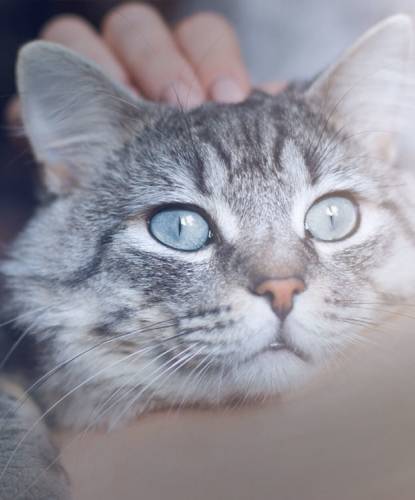
Updated May 20, 2021 – As human beings, we have a unique capacity to love. But with that love inevitably comes grief. Because of how we come to love our pets, we experience profound loss when one of them becomes ill or dies. Everyone mourns in their own way and there is no timeline or formula for processing loss.
FACTORS THAT COMPLICATE GRIEVING
According to the Argus Institute at Colorado State University, there are several factors which can complicate an already difficult process. This list includes:
- No previous experience with significant loss, death or grief
- A personal history involving multiple losses or other recent losses
- Little or no support from friends or family
- Societal norms that trivialize and negate the loss
- Insensitive comments from others about the loss
- Feelings of guilt or responsibility for a death
- Untimely deaths like those of a young companion animal
- Deaths that happen suddenly, without warning, and those that occur after long, lingering illnesses
- An unexplained disappearance
- Not being present at death
- Witnessing a painful or traumatic death
- Deaths that occur in conjunction with other significant life events like birthdays, holidays or a divorce
TOOLS TO HELP
There are some strategies we can use to help ourselves, and those we care for, during the grieving process.
TIME
No one grieves on a prescribed timeline. Everyone is different and some losses take longer than others to move through to a place of acceptance. Be gentle with yourself and honor the time it takes to heal.
STORY
Share the story of your loss with those you care about and who care about you, but also share your joyful memories.
CONNECT
Find and make use of your support system. Understand that not everyone knows how to support someone in grief.
If there are other pets in the home, they may grieve too. Some may need to connect while others may need to retreat to process the loss of the companion animal that shared their home.
RETREAT
While connections are helpful, also recognize there will be times you need to retreat and recharge. Grieving drains your energy, and you may need more quiet time to recharge than you normally take.
LISTEN
Pay attention to your self-talk. If your emotions are spiraling out of control, you may need additional support.
SUPPORT
If you know someone who is grieving the loss of a pet, the best thing you can do is be a good friend. You can’t fix it for them, but you can help them heal by being there for them. Let them know you are thinking about them.
MEMORIALS
Memorials are a beautiful way to honor the memory of a beloved pet. At Morris Animal Foundation, our memorial card program provides an easy and thoughtful way to memorialize a beloved pet while supporting science that advances animal health. It’s another way to create a living legacy in your pet’s name. A memorial card also is a heartfelt way to reach out to a friend or family member who has lost a pet.
RESOURCES
Sometimes we all need additional support when moving through a loss. Many veterinarians have materials they can give you to help with the grieving process, and they also may have suggestions regarding a memorial or other tribute for your pet. Local animal shelters often have pet loss groups based out of their facilities or know of other groups that can provide needed support.
Recommended online resources or help lines include:
- The ASPCA Pet Loss Helpline (877.474.3310)
- The Association for Pet Loss and Bereavement
- Colorado State University Argus Institute
- Dumb Friends League
- Human Animal Bond Trust
- Tufts University Pet Loss Support
There also are excellent written resources to help both children and adults dealing with grief and loss. Recommended readings (adapted from the Dumb Friends League) include:
For children:
- “When a Pet Dies” by Fred Rogers
- “Dog Heaven” and “Cat Heaven” by Cynthia Rylant
- “The Tenth Good Thing About Barney” by Judith Viorst and Erik Blegvad
- “Charlotte’s Web” by E.B. White
For adults:
- “Coping With Sorrow on the Loss of Your Pet” by Moira Anderson Allen M.Ed.
- “To Dance with the White Dog” by Terry Kay
- “Animals as Teachers and Healers” by Susan Chernak McElroy
- “It’s Okay to Cry” by Maria L. Quintana
- “The Loss of a Pet: A Guide to Coping With The Grieving Process When a Pet Dies” by Wallace Sife
Losing a beloved pet is difficult, but knowing there are resources available, and realizing you’re not alone when it comes to pet loss and grief, can make the process just a little easier.

TELL THEIR STORY
One of the hardest parts of pet ownership is knowing you won’t be together forever. Our new Furever Memorials can help, where you can create a free memorial, share photos and memories with family and friends, and become part of a supportive community.




